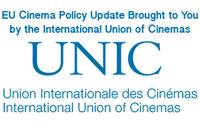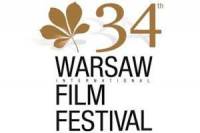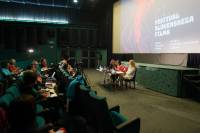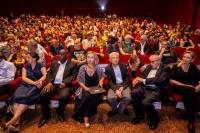WARSAW: FNE has teamed up with the Brussels based team of the International Union of Cinemas (UNIC) to bring you regular updates on EU cinema policies that impact all industry professionals across Europe. Click here for FNE UNIC EU Cinema Policy Update.
EUROPEAN PARLIAMENT SIDES WITH CREATORS IN CRUCIAL VOTE ON THE COPYRIGHT DIRECTIVE: A GREAT STEP FORWARD FOR COMPOSERS AND SONGWRITERS
Press releases 12-09-2018
The European Parliament confirms its support for authors’ rights in the Digital Single Market
Press releases 12-09-2018The Federation of European Film Directors (FERA), the Federation of Screenwriters in Europe (FSE) and the Society of Audiovisual Authors (SAA) welcome the vote on the Copyright Directive in the Digital Single Market by the European Parliament’s plenary.
They thank the Members of the European Parliament for listening to the authors and for establishing the need to define rules in the digital space to guarantee authors’ rights and support European creation.
FERA, FSE and SAA are particularly pleased with the adoption of significant improvements to provisions respecting fair remuneration in contracts of authors and performers, as well as the confirmation of the introduction of a very much needed new Article establishing a principle of fair and proportionate remuneration for authors from the exploitation of their works, including online (new Article -14). They insist on the need for the upcoming trilogue process to confirm this basic provision in favour of audiovisual authors and general improvements to Chapter 3, to effectively support European creators in the digital era.
Quotes
“In spite of a very aggressive campaign against the proposed Copyright Directive, the Members of the European Parliament voted in favour of authors and the recognition that they need to be remunerated by whoever exploits their works. This is a big step forward that will have to be consolidated and even improved.” said Cécile Despringre, SAA Executive Director.
“European screenwriters and directors’ work is hindered today by unstable, low income. The European Parliament rightly exercised its power to reverse the trend and set more sustainable conditions for tomorrow’s European audiovisual creation”, said Pauline Durand-Vialle, FERA Chief Executive.
“Today’s decision by the European Parliament will finally allow screenwriters and directors to benefit from the ever growing on-demand exploitation of their works”, said David Kavanagh, FSE Executive Officer.
EU Copyright Directive
25/08: Copyright Plenary Vote: Big Tech Tactics Revealed – Creativity Works!
Following the July Plenary vote, and the intense disinformation campaign produced by Big Tech, journalists and policymakers alike have uncovered disturbing truths.
27/08: Europe’s creative & cultural actors unite to call for an online environment that works for EU creativity – europeforcreativity.org
“We prefer to invest our time and/or money in creation, jobs, growth and a plural and diverse cultural landscape. That is what we believe Europe is about. Real people that create real things and really want this reform to ensure the online world plugs the value gap”, mentions the statement.
04/09: MEPs in last-minute meeting ahead of crunch EU copyright vote – The Parliament Magazine
MEPs were meeting on Tuesday in a last-minute effort to agree a compromise that will be acceptable to a majority of deputies ahead of a key vote next week on the reforming EU copyright rules.
10/09: Intense lobbying continues ahead of EU copyright vote – The Parliament Magazine
World famous artist Wyclef Jean has joined others in urging MEPs to this week vote against a proposed reform of the EU copyright laws which has returned to the plenary following Parliament’s decision not to enter the interinstitutional negotiations.
EU Audiovisual Media Services Directive
03/09: MEPs to vote on EU audiovisual media services reform next month – The Parliament Magazine
A vote in plenary in Strasbourg, the first after the summer recess, to endorse the new rules is likely to take place in the week starting 10 September.
European Elections 2019
24/08: 2019 European elections 'could be the most decisive yet' on future of EU – The Parliament Magazine
The next European elections could see a “flattening out” of the centre and further fragmentation of party support, according to a new report.
Recent Studies
EAO - The origin of films in VOD catalogues - August 2018IVIR Amsterdam - Global Online Piracy Study - July 2018EU OMC - The role of public policies in developing entrepreneurial and innovation potential of the cultural and creative sectors - April 2018
Events
12 September: European Parliament Plenary Vote - EU Copyright Directive
24-27 September: FNCF Congress 2018 - Deauville 26 & 27 September: EUIPO Plenary Meeting 2018 - Alicante
4 October: European Creative Industries Summit (ECIS) 2018 - Vienna
8-9 October: Challenging (the) Content – Content made in Europe in the digital economy - Vienna
8-11 October: NATO Fall Summit
10 October: CICI Lunch - European Parliament, Brussels
15 & 16 October: UNIC Cinema Days - Brussels
A showcase of 8 documentary talents will be presented at the dok.incubator preview on 23rd September at Nordisk Panorama. Three films from the previous edition premiered at IDFA, one at Sundance, three competed at CPH:DOX, two were shown at Hot Docs and one has been selected for nomination for the European Film Academy Award. It is of no surprise, that this year’s preview of films, developed in partnership with the well-established rough-cut workshop dok.incubator, raises great expectations. Collection of this years’ carefully selected documentaries brings a focus on the variety of approaches to nowadays family and personal values.
A vibrant portrait of a young generation where everything is possible and nothing is private anymore - Searching Eva (DE) takes us to online life, where the line between real and virtual is blurry, lived by Eva, the unlikely icon of the youngest internet anonymous crowd. The reality of today’s world in the Molenbeek district and its impact on the dreamy and magical world of two children, looking for life’s secrets and spells is the story Of Friends and Gods (FI, BE, DE).
In the breathtaking and very traditional Albanian mountains the ancient tradition of blood revenge is questioned as a young girl’s death has to be either revenged or forgiven by her family in The Business of Revenge (SI, RS, XK). Tradition and rituals are also a very important part of the exotic culture of Colombian Wayuu tribe where the border between life and death, dream and wakefulness, beginning and end can be unclear as shown in Lapü (CO).
The Disappearance of My Mother (IT, US) shows very different ankle of looking at contemporary family values - is a very intimate portrait of the closest and strongest bound – mother, an outstanding woman, feminist, activist, human rights defender, professor and fashion model seen through the eyes of her son, filming her for many years to prevent her from planned withdrawal and disappearance from the family world. On the contrary the lack of family ties and social relations has transformed a whole generation of elderly people in Rotterdam in a numerous group of single separated individuals with no contact with the outer world, The Good Neighbours (NL) try to make a change and fight loneliness by actually meeting their neighbours in person. Forgotten family secrets and lies are being uncovered by My Father, the Spy (LV, DE, CZ, EE) as we travel four decades back in time to reveal the second life of a Latvian double-agent at the United Nations. Back to the present – to The Men’s Room (NO) where the members of a men’s choir discover that their friendship is not only about beer and music when they have to face the limits and finality life brings.
The dok.incubator preview will be the final opportunity to see the just-about-to-release films before they take-off to international prestigious festivals.
For more information about the presented films, follow this link to: http://dokincubator.net/selected-projects-2018/
Lithuanian documentary Wonderful Losers: A Different World submitted for best foreign-language film Oscar nomination
Press releases 28-08-2018Arūnas Matelis’ feature documentary Wonderful Losers: A Different World has been selected as Lithuania’s entry for the Academy of Motion Picture Arts and Sciences’ award – the Oscar – in the best foreign-language film category. This is Matelis’ second film with a shot at an Oscar nomination. In 2008, the Lithuanian jury picked his documentary Before Flying Back to Earth to submit to the Academy.
This year, Matelis’ film was picked from among five shortlisted candidates: three documentaries and two fiction films. The other Lithuanian candidates for the best foreign-language film nomination were What We Leave Behind (dir. Jūratė Samulionytė, Vilma Samulionytė, 2017), Owl Mountain (dir. Audrius Juzėnas, 2018), Ancient Woods (dir. Mindaugas Survila, 2018), Miracle(dir. Eglė Vertelytė, 2017).
The winning documentary has been one of the most successful Lithuanian films in recent years. It has toured numerous international film festivals, garnering multiple prizes, as well as triumphing at Lithuania’s national Silver Crane awards as the year’s best documentary. The composer Alberto Lucendo has been awarded for composing the score for the film, which also took home the audience prize.
Wonderful Losers: A Different World tells a story of people at one of the world’s most prestigious cycling competitions, Giro d’Italia. An important, though generally overlooked, role at the Giro is played by the so-called “gregories”, cyclists who go through tremendous challenges in order to assure victory for their team’s leader. Matelis’ documentary glimpses into the behind-the-scenes world of the prestigious race that has been shielded from filmmakers’ cameras for four decades.
Matelis spent eight years making the film which is one of the biggest European coproductions, involving as many as eight countries: Lithuania, Italy, Switzerland, Ireland, Northern Ireland (the UK), Latvia, Spain and Belgium. The film’s production was supported by the Lithuanian Film Centre.
The Films Consequences and Winter Flies at the Toronto International Film Festival
Festivals 27-08-2018Consequences, the first film by the screenwriter and director Darko Štante, has qualified for the Discovery section of the Toronto International Film Festival, while the live-action feature coproduction Winter Flies by the Slovenian director Olmo Omerzu will be screened in the Contemporary World Cinema programme.
After nine years, two Slovenian films will be screened at the Toronto International Film Festival. Consequences, the first film by the screenwriter and director Darko Štante, has qualified for the Discovery section of the Toronto International Film Festival, while the live-action feature coproduction Winter Flies by the Slovenian director Olmo Omerzu will be screened in the Contemporary World Cinema programme.
Nine years ago, the live-action feature Slovenian Girl by the director Damjan Kozole, which had had its world premiere at the film festival in Sarajevo earlier, was shown at the Toronto festival, taking place between 6 and 16 September this year. The film has been screened at more than seventy film festivals and sold to thirty countries. It was renamed as A Call Girl in the United States.
The participation of Darko Štante's debut Consequences in Toronto will also be this film's world premiere. The first public showing will take place on 7 September at 21:30, and afterwards the film will have two other screenings for the general audience and another two for the professional community. The first two screenings will be attended by the director Darko Štante, the starring actor Matej Zemljič, and the producers Andraž Jerič and Jerca Jerič from the Temporama production house.
The film focuses on the 18-year-old boy Andrej, who ends up in a youth education centre. He has to fight for his place in a group of boarders led by Željko, who soon takes the newcomer under his wing. Under the pressure of the new environment, Andrej has to ensure that his secret does not come to light.
The live-action feature Winter Flies by the director Olmo Omerzu is a Czech-Slovenian-Polish-Slovak coproduction. The Slovenian (co)producer is Rok Biček from the Cvinger Film production house, otherwise a multiple award-winning director of the observational documentary feature Family.
The new film by Omerzu tells a story about the sly and confident Mára and the somewhat eccentric Heduš, who set out into the frozen wastes in search of adventure – by car, of course. After all, Mára will soon be fifteen years old. A road movie about flies that occasionally even buzz during wintertime, and a story that – before it concludes at a police station – explores the elusive ties of a boyhood friendship and the unappeasable urge for adventure – even if it is not precisely clear what sort of adventure that is.
The film received the Award for Best Direction at this year's international film festival in Karlovy Vary, and it will be distributed in Czechia as of September. The film's first audience screening in Toronto will take place on 12 September at 19:30.
Both works have been made with the financial support of the Slovenian Film Centre, and both of them have their Slovenian premieres scheduled at this year's 21st Festival of Slovenian Film.
The film festival in Toronto was established in 1976. In terms of visitors, it is now one of the largest festivals in the world, attended annually by more than 480,000 people. These include 5,000 accredited professionals, for whom the "Industry Center" in the Hyatt hotel, where the film market is also located, is intended. Under the auspices of the European Film Promotion, fourteen European countries will be presented there this year, including Slovenia and the Slovenian Film Centre, a member of the EFP.
In 1998, Variety magazine wrote the following about the festival: "The Toronto Film Festival is the only festival besides Cannes that screens film hits and movie stars as well as focuses on market activities." In 2007, on the other hand, Time magazine wrote that the Toronto International Film Festival "has transformed from the most influential autumn film festival into the most influential film festival."
The submissions are open for the Warsaw Industry Days Works-in-Progress. The organizers welcome works-in- progress that have not previously been presented at other markets or festivals until September 30, 2018.
Warsaw Industry Days looks for projects from Poland (including co-productions). For the selection of Works-in-Progress, submissions are open for full length feature film projects or documentaries, advanced in the shooting process or in post-production, not previously presented at other markets or festivals.
The footage for selection purposes should be:
between 1 and 20 minutes
via a web link to uploaded material (preferably vimeo links), with English subtitles.
The deadline for footage submission is September 30, 2018. Links to uploaded material should be sent to This email address is being protected from spambots. You need JavaScript enabled to view it.
Warsaw Industry Days will be held October 18-20, 2018, during the 34th Warsaw Film Festival.
It will consist of the following elements:
Warsaw Screenings - organized since 2000; the newest Polish films (fiction features, docs, and shorts), which have international potential, will be presented to international sales agents, distributors, and festival programmers;
Warsaw Works-In-Progress - presentations of selected works-in-progress from Eastern Europe;
First Cut Lab Warsaw - experts watch rough cut of selected films and suggest editing changes; organized in cooperation with Polish Film Institute;
Warsaw Next - workshop for young Polish filmmakers, who have at least one short film to their credit; meetings with Polish and international professionals; lectures and masterclasses; participation in Warsaw Industry Days;
FIPRESCI Warsaw Critics Project - since 2006; workshop for young film journalists and critics from Central and Eastern Europe, organized in cooperation with FIPRESCI;
Doc Lab Poland - presentations of documentaries in various stages of production and post-production; organized by the Ślesicki Foundation;
Open Workshop "The Art of Film Editing", organized with Polish Film Editors Association. contact: This email address is being protected from spambots. You need JavaScript enabled to view it.
The 21st Festival of Slovenian Film will be held in Portorož between 10 and 15 September 2018. As there seems to be no end to new creative endeavours, this year's edition of the Festival of Slovenian film will be one day longer than the previous one. Also, the festival venues have expanded to include the Monfort Exhibition Space as well as Avditorij Portorož. In order for the Festival to reach the widest film audience, a selection of Competition and Panorama films will also be screened in the Komuna Cinema, Ljubljana. As already announced, this year's recipient of Badjura award is screenwriter and director Tugo Štiglic: a tribute to him will comprise three of his youth feature films that have left a lasting mark on the Slovenian cultural sphere. Beginning on the opening day at 6 p.m., photographs and posters will be on display in the White Hall to present and commemorate the creative work of the award recipient.
To introduce today's press conference, Nataša Bučar, Director of the Slovenian Film Centre, a public agency, discussed the importance of the festival for Slovenian cinema and filmmakers. Jelka Stergel, Director of the 21st Festival of Slovenian Film, continued by presenting the programme concept, members of juries and attributes of this year's Slovenian film production. When first announcing the festival, she said, “The major feature of this year's selection of films is the diversity of genres, styles and of the topics explored by filmmakers. In recent years, we might have gotten used to a considerable overlapping of styles in exploring topics that were mostly of social nature, however, the current production features urban stories of distinct genres as well as subtle original personal pieces. The selection of best documentaries also brings a range of genres: a music documentary, a biographical and an autobiographical one, a historical and a war-themed one, etc.”
Premieres of Versopolis a short film by Jan Cvitkovič, and of My Last Year As a Loser, a feature by Urša Menart, will open the Festival. The Opening Gala will be hosted by Jure Longyka, and after the ceremony, a reception with a concert by Tonja Princess Trio will be held in the Timber Hall of Monfort Exhibition Space.
This year's Festival of Slovenian Film will again be supplemented with events for film professionals, whose contents will undoubtedly be of interest to the general public as well. Industry events will be held over four days, from Wednesday 12 September to Saturday 15 September. Special emphasis will be placed on the second in the series of co-production meetings. Organised in cooperation with Film Center Serbia, the event will feature pitches of Slovenian works in progress that show interest in seeking co-producers from Serbia. MAIA Workshop, an international training programme for emerging producers, will also visit Portorož during the Festival. As part of the Festival's Industry Events, Daniel Díaz, MAIA Workshop's visiting expert, will be sharing his experience in film and digital marketing in an open seminar.
Tjaša Smrekar, Festival manager, presented the festival in the organisational sense. Films in competition will be screened in the Main Hall of Avditorij Portorož, whereas the Monfort Exhibition Space will be hosting the screenings of the Panorama programme, co-productions, and Tribute section, as well as the daily evening programme with a series of concerts. Admission to all film screenings in the former salt warehouse Monfort will be free, subject to capacity, whereas evening events will be open to visitors with accreditation or a ticket for any festival screening. For all visitors unable to head to Portorož, a selection of 10 documentary films will be screened in the Slovenian capital, in the Komuna cinema. On Sunday 16 September and Monday 17 September, Komuna will also hold screenings of the winning films of the 21st Festival of Slovenian Film.
Over a little less than a week, the main Slovenian film event offers an overview of Slovenian film production, which includes fiction, documentary and animated films of all lengths. The programme, all sections included, is composed of 111 films. The official Competition programme consists of 16 features, 6 medium-length films, 17 shorts, 10 student films and 3 minority co-productions. In total, 154 films were submitted to the festival for consideration by the Programming Board.
“Slovenian cinema has got tremendous drive, which has also been attested by the international activity of our filmmakers. The result is six outstanding co-productions, which includes this year's winner at the Karlovy Vary festival, Winter Flies by Olmo Omerzu, and recipient of two Golden Arenas, for Best Film and Best Director among Croatian minority co-productions, at this year's Pula Film Festival, The Frog by Elmir Jukić. The programme also includes two features made with the help of the Cash Rebate Scheme,” added Jelka Stergel.
To sum up: 52 films will be competing for official festival awards. Special presentations include 11 films made by primary and secondary school students in the Youth Wing section, and an additional section of 9 short children's animations. The Tribute section presents a selection of classics to pay homage to the history of Slovenian cinema. This year, it includes three feature films by Tugo Štiglic, this year's Badjura Award recipient.
Those who have recently left us in the harsh reality of the fleeting earthly existence will be there with us in spirit: Štefka Drolc, Demeter Bitenc, Jernej Šugman, Miki Muster, Gašper Tič.
The 21st edition of the Festival of Slovenian Film opened last night in Portorož, Slovenia, with the presentation of the 2018 Metod Badjura Lifetime Achievement Award. Introduced to honour lifetime achievement in filmmaking in 1995, the award was presented to this year’s recipient, screenwriter and director Tugo Štiglic, by Nataša Bučar, Director of the Slovenian Film Centre. The 21st FSF runs until Saturday 15 September.
Last night’s gala opening in the Main Hall of Avditorij Portorož featured premiere screenings of Versopolis, a short film by Jan Cvitkovič, and My Last Year as a Loser, a feature film by Urša Menart.
Opening addresses were given by the Mayor of the Piran Municipality, Peter Bossman, and the Director of the festival, Jelka Stergel.
Hosted by Jure Longyka, the ceremony also saw a performance by young dancers of the Impress Dance Studio, aged 9 to 15. Their dance number to the music from Štiglic’s feature Summer in a Sea-Shell was prepared especially for this occasion under the supervision of their mentors, Romana Fičur and Eva Tancer. The night continued in the Timber Hall of the Monfort Exhibition Space with a concert by Tonja Princess Trio.
Over a little less than a week, the main film event in Slovenia offers an overview of what Slovenian cinema has produced in the past year, which includes fiction, documentary and animated films of all lengths. The programme, all sections included, is composed of 111 films. The official Competition programme consists of 16 features, 6 medium-length films, 17 shorts, 10 student films and 3 minority co-productions. In total, 52 films of various categories and genres are in competition for the official festival Vesna Awards. Meanwhile, the Panorama programme includes 38 films, of which 5 features, 8 medium-length films, 13 shorts, 9 student films and 3 minority co-productions. 16 feature films are in the running for the Audience Award.
Films in competition are screened in the Main Hall of Avditorij Portorož, whereas the Monfort Exhibition Space is hosting the screenings of the Panorama programme, co-productions, and Tribute section, as well as the daily evening programme with a series of concerts. In Ljubljana, the Komuna cinema is screening a selection of 10 documentary films, as well as screenings of the winning films on Sunday 16 September and Monday 17 September. This year's festival is again supplemented with events for film professionals, whose contents will undoubtedly be of interest to a wider audience.
The festival poster features a jellyfish, its tentacles reaching for the passer-by. As it was emphasised at the opening ceremony and during festival preparations: “What Slovenian cinema and our symbol for this edition share, is resilience. Having existed for at least 600 million years and endured numerous changes to the environment, jellyfish have an astonishing capacity for self-renewal. We should follow their example – also in terms of stinging others with our edgy creations when they deserve it.”



























